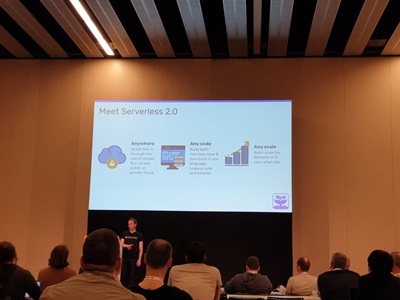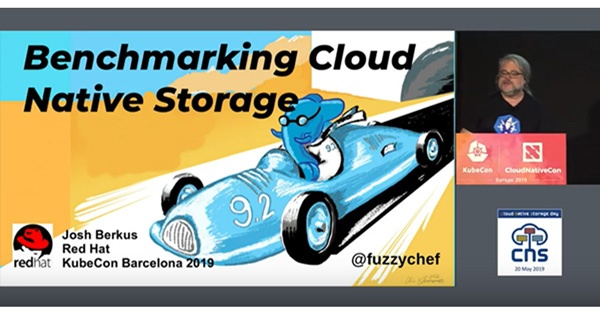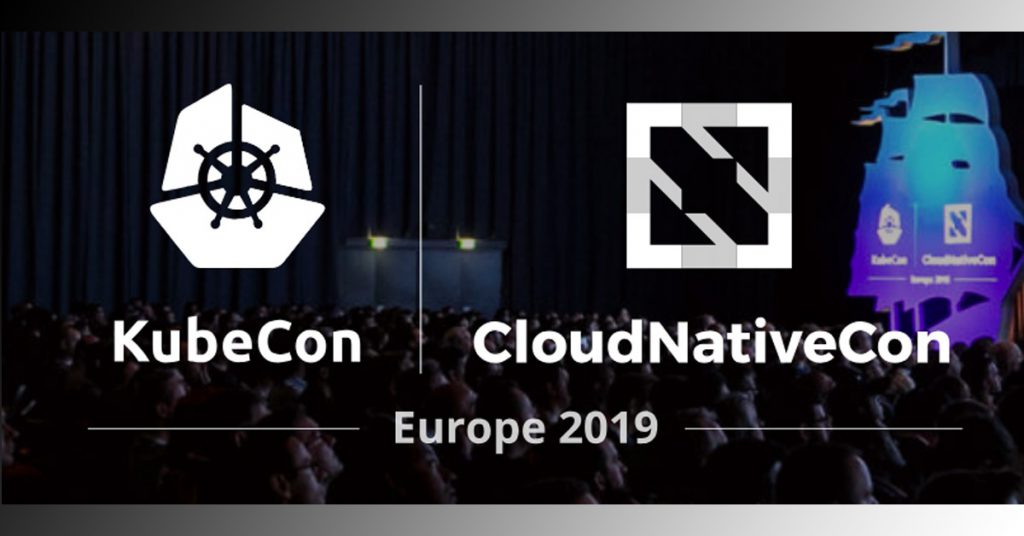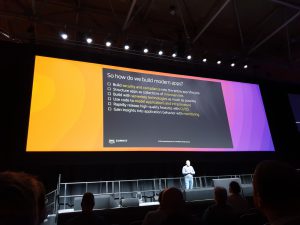Last month, we enjoyed 2 large cloud events in Barcelona! We’re delighted to announce 5 Simtech consultants have attended KubeCon + CloudNativeCon Europe and Dynatrace Perform Europe.
Throughout the week, we have enjoyed learning from thought leaders and key players in the industry. We strive to improve our practices to help clients deliver more business value and we are happy to help out with proactive discussions around best solutions. We are always available to assist you in creating, managing, and supporting your organization’s entire IT infrastructure.
KubeCon Europe 2019 – Topics from Simtech Consultants
KubeCon started for us with a wide variety of co-located events. We joined the OpenShift Commons Gathering, Serverless Practitioners Summit, and Cloud Native Storage Day. There were also some very interesting Lightning Talks. Next up, we will present the most relevant information and selected topics (biased by our engineers :)).
Serverless, many more Serverless Cloud Computing news
Serverless is the fastest growing cloud service, with a 75% growth rate year over year (RightScale State of the Cloud Report 2018). At KubeCon 2019 there were more than twice as many serverless talks than in the previous year and we had the pleasure of attending the first ever Serverless Practitioners Summit.

The summit was a great opportunity to meet people from the community and exchange knowledge. Serverless is maturing as a technology, and we as a community are working together to help it reach the next milestone. Serverless 2.0 is all about interoperability and multi-cloud, language-agnostic development of microservices and functions, and improvements to the existing scalability model. The CNCF is focused on creating standards around serverless to facilitate serverless adoption and usage.
A great example is CloudEvents, a specification for describing events in a common way. CloudEvents aims to simplify integrations across platforms and leaves the event business logic format to the application. Knative is an example of a FaaS platform that adheres to CloudEvents and is even using it for its internal routing. Hopefully, more and more serverless providers will follow suite.
“It is great to see how quickly open-source FaaS platforms are improving. I believe the key driver is the excellent cooperation between industry giants, startups, and individual contributors. To foster innovation, a healthy and diverse community is essential.”, mentioned Lucian Toader, Cloud Engineer.
There were also some great presentations given by people from OpenFaaS and Knative, discussing new features, improvements to performance and security, as well as future plans.
A feature from OpenFaaS that really caught our attention is FaaS federation. This allows you to unify multiple FaaS platforms under a single API and route traffic to different FaaS platforms based on the metadata you define. For example, you can decide to run all shorter-lived functions on AWS Lambda and longer-lived functions (that might go past Lambda’s function timeout) using OpenFaaS on Kubernetes.
Wondering how the keep up with the latest Serverless news? Check out our Deconstructing Serverless Computing blog posts by Lucian. In a series of articles, he explores serverless computing further, looking at it from a business perspective as well as from a developer’s point of view.
Cloud Native Storage Day
This event brought together users of container native storage (CNS) technologies, as well as experts from the top CNS companies. It was a day filled with thought-provoking sessions, including technical demos, panel discussions, presentations, and networking opportunities.
“Good to hear great ideas and see some of the latest innovations being developed. Shared Simtech’s vision on being a facilitator and accelerator for cloud native container and database initiatives within the market of digital transformation.”, René Simoons, founder of Simtech Consulting.
René was part of a panel discussing the future of Container Native Storage. A great initiative from StorageOS, which resulted in valuable insights regarding best practices for deploying stateful applications, as well as the benefits and downsides of CNS.
Kubernetes, K8S Operators and Stateful Applications
After a lovely pancake breakfast to start the day, we attended an interesting OpenShift Keynote: Expanding the Kubernetes Operator Community by Rob Szumski, Principal Product Manager for OpenShift, Red Hat.
“Operators are the name of the game for Kubernetes in 2019“, shared Joost van Kouwenhoven, Engineering Consultant.
Kubernetes has proven to be a good solution for stateless applications in the last few years, but stateful applications have been more challenging. With operators and the Operator Framework, all application specific operational procedures can be automated and integrated with the Kubernetes API. Operators can be shared through the OperatorHub, so there is no need to reinvent the wheel. Even OpenShift 4.0 is completely powered by operators.
Operators enable you to run those “tricky” stateful services and complex distributed systems on Kubernetes. Szumski mentioned you can find ready-to-use Operators on OperatorHub.io and learn about the tools at your disposal to build, test, and ship an Operator.
Container Native Storage Benchmarking
There were two interesting talks on container native storage benchmarking. They were extremely relevant to us, as we are in the process of performing our own container native storage benchmark.
Andrej Golis, Cloud Engineer, mentions that: “Storage benchmarking has been essential for decades now. It is especially important in the case of hyper-converged software-defined storage, since you now have to go through an additional abstraction layer between the application and the raw storage.”
The first interesting technology update, especially in the cloud native storage space, was ‘Benchmarking Cloud Native Storage’, by Josh Berkus from Red Hat. In this talk, he explained his motivation behind benchmarking the storage – running databases on Kubernetes/OpenShift with Rook/Ceph as a storage solution – as well as the methodology and results.

You can see his full talk here.
The second talk was ‘Benchmarking Cloud Native Databases Performance on Kubernetes’, by Iqbal Farabi and Tara Baskara from GO-JEK. In this talk, they took a look at cloud native database performance, namely CockroachDB, TiDB, and YugaByte DB and provided a detailed explanation of the results.
As there are almost no benchmarking results available on cloud-native databases and storage, we can expect to see more efforts in this field in the near future.
We will be releasing our own benchmarking results soon, so stay tuned!
OpenShift Consultancy
Do you wonder how your IT infrastructure can continuously evolve and will stay ahead of demand? We have OpenShift architects, engineers, and consultants available for new developments, PoC, and/or relevant projects. Feel free to get in touch with us for related OpenShift services!
The next event we have scheduled is in the first week of June when we are present at the 3-day ISPDC 2019, with 2 colleagues as speakers as well. An international symposium at the VU University of Amsterdam about the future state of Distributed Computing!
Related to KubeCon, we are already looking forward to KubeCon + CloudNativeConEurope 2020, which will take place in Amsterdam! March 30 – April 2 are the dates for a couple of days in the Netherlands as the center of the cloud native world.



